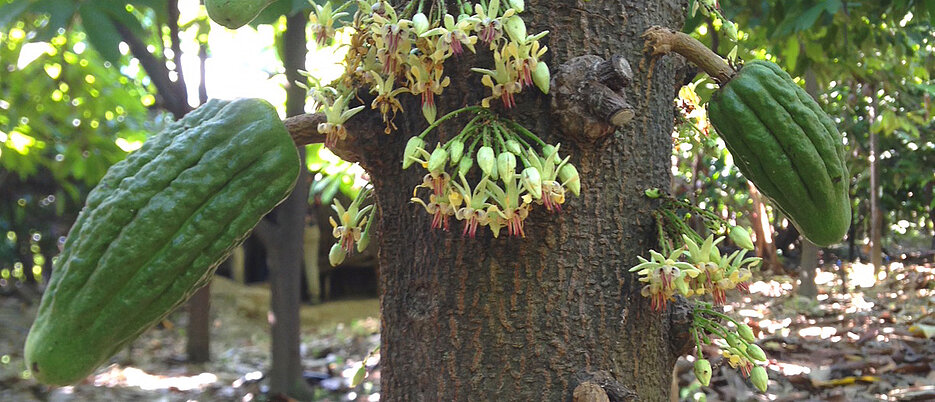Optimized Cacao Pollination for Higher Yields
09/13/2023How can the cultivation of cacao be improved by using the right pollination technique? This has now been investigated by a research team including Ingolf Steffan-Dewenter's Department of Animal Ecology and Tropical Biology.

The success of cacao cultivation depends to a large extent on functioning pollination. If there is a lack of pollinators, for example, this leads to lower yields - and thus to financial problems for farmers. A study involving the University of Würzburg (JMU) has now investigated how the yield and quality of organic cacao can be increased - through a more efficient plantation design that’s taking ecological aspects into account. During field research in Peru, the researchers identified pollination techniques that improved pollination success and produced higher quality fruit.
To do this, the team first compared self-pollination of the flower with cross-pollination. In self-pollination, the stigma is pollinated by pollen from one's own flower (which are genetically identical), whereas in cross-pollination the pollen comes from a flower of another cacao tree. The result: While self-pollination led to only limited success, this value improved three to eight times with cross-pollinated plants.
Study provides basis for improved plantation design
"Cacao has a mechanism that seems to prevent self-pollination," explains Dr Justine Vansynghel, researcher at the Department of Animal Ecology and Tropical Biology (Zoology III). A high genetic difference, that is the lowest possible degree of relationship between pollen donor and pollen recipient, is crucial for pollination success.
"Our research helps farmers in a very concrete way to optimize their plantations for natural cross-pollination in the future," she continues. "We can identify pollinator-recipient combinations that produce high-quality fruit and should therefore be planted spatially close together. This goes hand in hand with better land use, higher yields and thereby a higher income for farmers." In addition to genetic make-up, the scientists were even able to identify other environmental factors that affect pollination success, such as temperature and relative humidity.
The research project was conducted on behalf of the German Federal Ministry for Economic Cooperation and Development (BMZ) by the University of Würzburg together with the University of Göttingen and Bioversity International. Financial support was provided by the Fund for International Agricultural Research (FIA), the German Society for International Cooperation (GIZ) and funding from the global research partnership CGIAR.
About the Chair of Animal Ecology and Tropical Biology (Zoology III)
The Chair of Animal Ecology and Tropical Biology (Zoology III) at the University of Würzburg has a long-standing international reputation in global change research. The team led by Professor Ingolf Steffan-Dewenter investigates the causes of the regional and global decline in biological diversity. One focus is the study of insects and their ecology.
Publication
Cross-pollination with native genotypes improves fruit set and yield quality of Peruvian cacao. Justine Vansynghel, Evert Thomas, Carolina Ocampo-Ariza, Bea Maas, Carlos Ulloque-Samatelo, Dapeng Zhang, Teja Tscharntke, Ingolf Steffan-Dewenter. Published in Agriculture, Ecosystems and Environment. DOI: 10.1016/j.agee.2023.108671. https://authors.elsevier.com/a/1hTtNcA-Inxce
Contact
Dr Justine Vansynghel, Researcher at the Department of Animal Ecology and Tropical Biology, justine.vansynghel@uni-wuerzburg.de






